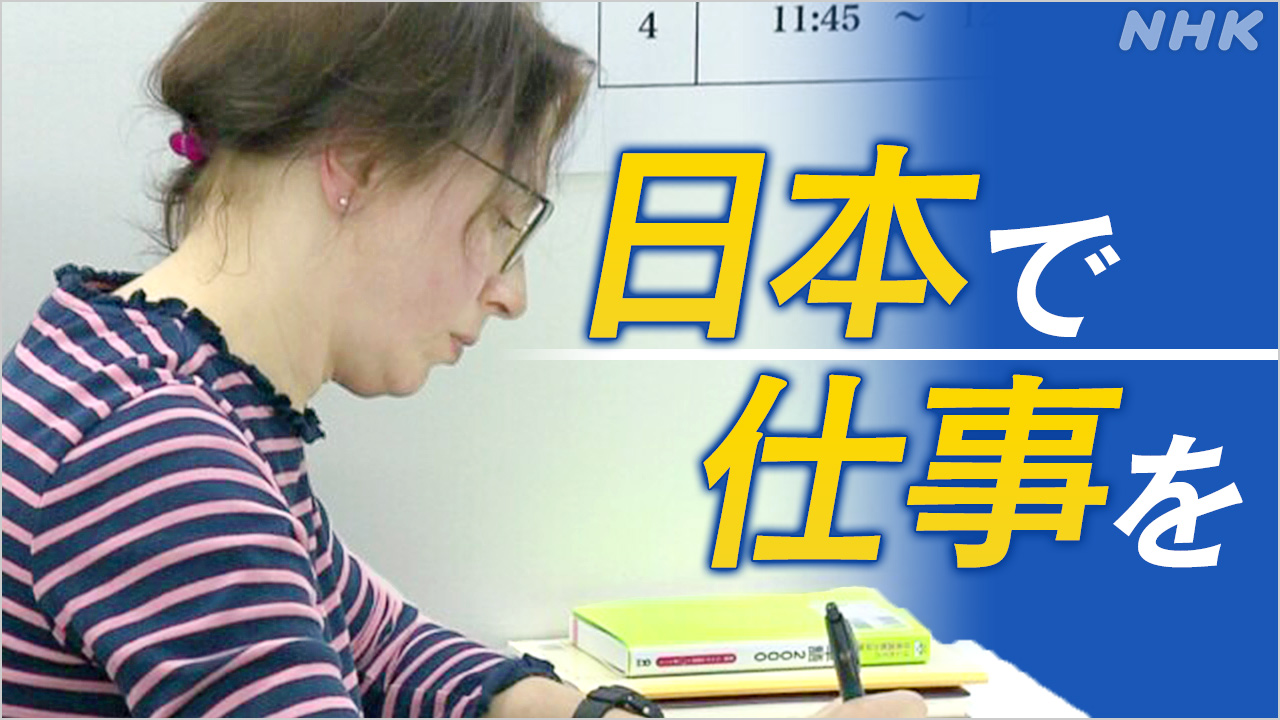The 24th marks two years since Russia began its military invasion of Ukraine.
Approximately 2,100 people from Ukraine are still evacuated to Japan.
As life in Japan becomes longer, many evacuees are having trouble finding employment.
Attending Japanese language school and aiming to obtain a medical license
Natalia (49), who evacuated to Japan from Kyiv, the capital of Ukraine, with her second daughter, a junior high school student, a year ago, has been living with the help of her eldest daughter, who has been living in Japan for some time.
I didn't work in Japan, but since the evacuation period has been prolonged, I am currently looking for a job in the medical field, using the knowledge and experience I gained from working as a psychiatrist in Ukraine.
However, in order to work as a doctor in Japan, you need Japanese qualifications, and there are also language problems, so I was unable to get the job I wanted, so I received a scholarship from the Nippon Foundation to attend a Japanese language school and obtained a medical license. We are aiming for
Natalia
: ``When I first came to Japan, I didn't think about working, but two years after the invasion began, and as I continued to live in Japan, I started looking for a job.If possible, I would go to a hospital. I hope to be able to work there.I want to start working as soon as possible.”
“About half of evacuees need employment support” Nippon Foundation
In a survey conducted by the Nippon Foundation among evacuees in Ukraine, approximately half of them answered that they needed support in finding employment.
In a multiple-answer question about necessary support other than the provision of benefits and daily necessities, `
`Job introductions and vocational training'' was the most common answer at 44.7%, followed
by ``Making Japanese friends'' at 34%, and
▽ ``Japanese language education'' accounted for 29.4%.
As the evacuation period becomes longer, support for finding employment has become a major issue.
“Leverage your skills and experience to get a job that meets your wishes”
Under these circumstances, efforts are being made to connect evacuees to employment in accordance with their wishes.
WELgee, an NPO in Tokyo that provides employment support for foreigners, meets with evacuees looking for work, listens to their wishes, and then offers them full-time jobs that allow them to utilize their skills and experience. Introducing work.
We provide guidance on how to write resumes, practice interviews, and coordinate with companies, and so far we have helped four evacuees find employment.
Among them, Anna Shalhorodovska, who evacuated from Donetsk Oblast in eastern Ukraine, was hired as an employee of an international NGO in December of last year, based on her experience working as a junior high school teacher and reporter. .
She is currently in charge of research on Ukraine and holding workshops for Japanese students.
Anna
: ``The work is not easy, but it is very rewarding.Through my work, I not only gain work skills, but also deepen my understanding of Japanese people and feel that it helps me in my daily life.'' "I'm here"
In addition, a person in charge of Plan International, an international NGO that hired Anna, said, ``What we take for granted in Japan and Ukraine are different, so we work together through trial and error.Anna also learns a lot every day. But for us, they have also taught us what we lack and what we need to gain, such as how to speak and how to approach discussions."
Nana Yamamoto, WELgee
: ``Patient support is required until the employer and the person come to a mutual understanding, but we have received feedback from the companies and organizations that have accepted us that they are glad we hired them.Ukrainian people are thriving in Japan. I think it would be good for employers to think of evacuees as an investment in creating a new future in order to create opportunities for them."
Expert: “Get between evacuees and companies and provide support as an escort”
Regarding employment for people who have evacuated to Japan from Ukraine, Yasuhiro Hitomi, an associate professor at Musashi University's Faculty of Sociology, who is knowledgeable about refugee issues, points out the following.
Yasuhiro Hitomi, Associate Professor, Faculty of Sociology, Musashi University,
``Many evacuees in Ukraine have global understanding and skills, but there are cases where it is difficult to find the jobs they are looking for, or where companies are unable to properly incorporate evacuees. I have heard that there are people who can come between evacuees and companies and provide support in an accompanying manner, which will be of great help in matching jobs.
" Having people in the company who are accustomed to such an environment when services are required will greatly contribute to the company's growth.Various companies have heard of successes in hiring Ukrainian evacuees. If this becomes the case, it will be an opportunity for more companies to be proactive in hiring."

